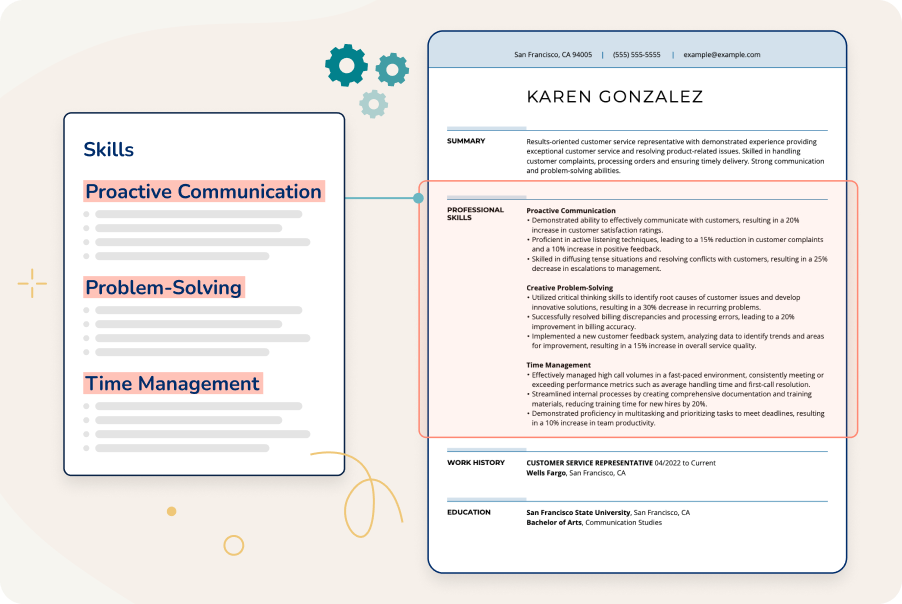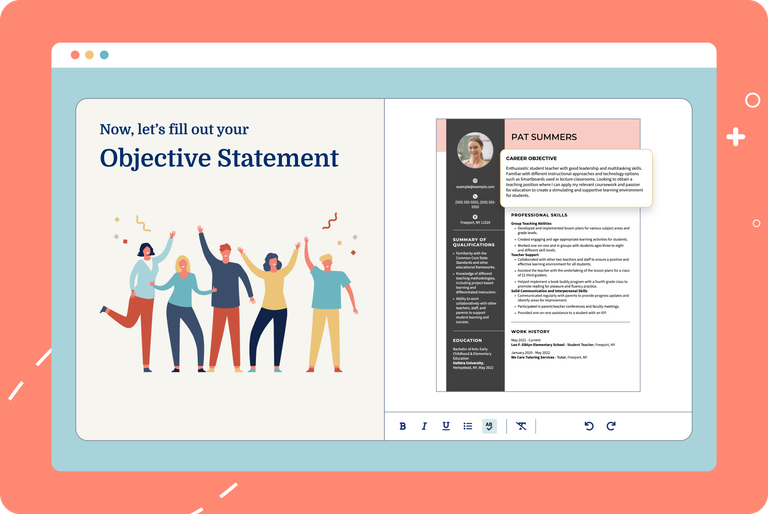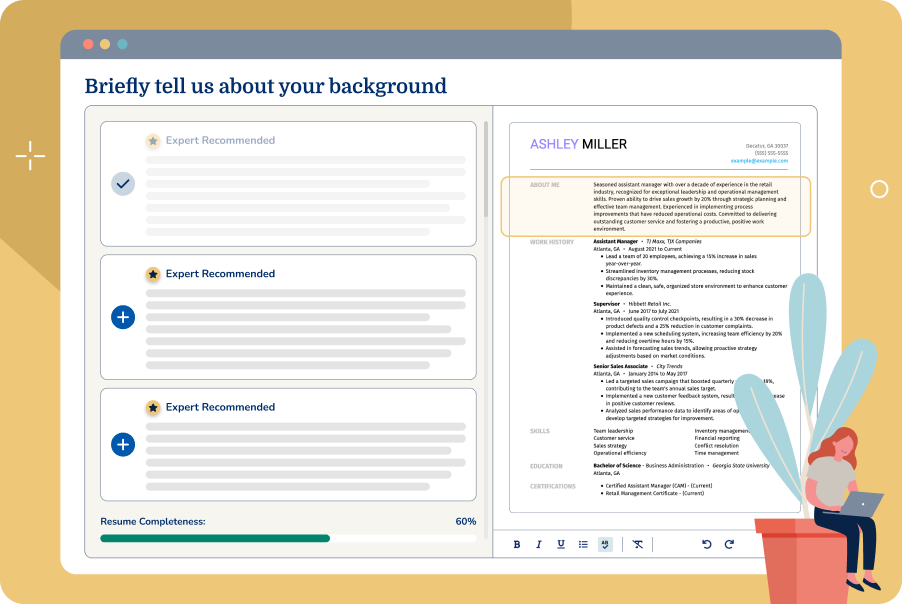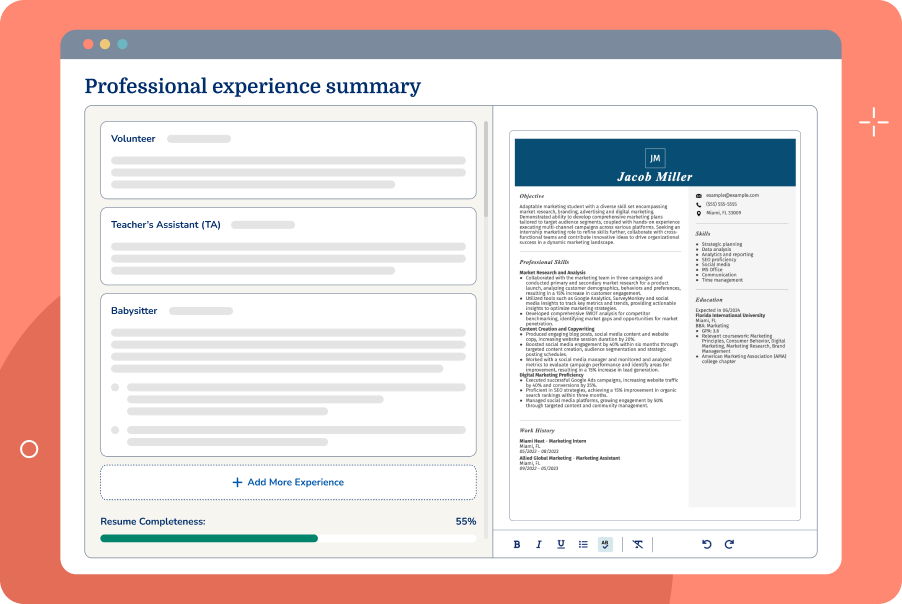How to Write a College Application Resume (Examples & Tips)

Our customers have been hired at: *Foot Note
A strong high school resume for college applications provides admissions officers with a clear snapshot of your academic achievements, extracurricular activities, and potential as a student.
This guide will help you create a polished and compelling resume that sets you apart from other applicants and showcases your unique strengths, experiences, and contributions.
Do You Need a Resume for College Applications?
While not required by all colleges, a strong student resume can be a valuable addition to your college application and help you present yourself in the best possible light to admissions officers.
Even if the colleges you are applying to do not require a resume, there are additional reasons you may choose to make one:
- Teacher recommendations: A comprehensive resume can help your teachers write detailed and personalized recommendation letters that highlight your strengths.
- College admission interviews: Some colleges may request a resume for admission interviews. Having one on hand showcases your organizational skills and preparedness.
- Scholarship applications: Many scholarship applications require a resume as part of the submission process. You can use our high school resume templates to get started.
- Work-study programs: If you're interested in participating in a work-study program, a resume is essential for highlighting your relevant skills and work experience.
- Networking: A resume can be a valuable networking tool. It allows you to quickly and effectively share your qualifications with potential mentors, advisors, or employers.
- Supplementing the Common Application: A resume can serve as a supplementary document, providing additional details about your experiences and qualifications
A well-crafted college application resume highlights areas of strength, leadership, and passion that may not be immediately apparent from your academic transcript or test scores.
College Application Resume Template
You can edit this sample resume template for college applications using our Resume Builder to easily adjust the formatting and add content written by professional resume analysts.
What to Include in a High School Resume for College Applications
The goal of your college application resume is to highlight your potential as a student and to provide admissions officers with a well-rounded view of your relevant experiences.
Tailor your resume to the specific requirements of each college you are applying to and seek feedback from an advisor or mentor to make it as strong as possible.
Here are some key items to include on a high school resume for college applications:
- Contact information: Your full name, address, phone number, and professional email address. See our resume examples for ideas on how to display your contact details.
- Education: High school name, location, and expected graduation date, as well as any academic honors or awards you've received.
- Extracurricular activities: Clubs, sports teams, volunteer work, internships, or other organizations you've participated in.
- Leadership positions: Any roles you've held in clubs or organizations, such as president, captain, or editor.
- Work experience: Any work experience, such as part-time or summer jobs you've had, including job title, company name, and dates of employment.
- Volunteer experience or community service: Volunteer or community service experience, including the organization, your role, and the hours you contributed.
- Skills: Any technical skills or soft skills you've developed, such as proficiency in a foreign language, computer programming, or public speaking.
- Awards and honors: Any academic or leadership awards you've received, such as National Honor Society, AP Scholar, or Eagle Scout.
See our guide on what to put on a resume for additional tips about what to include in each section of your resume to stand out.
How to Write a Resume for College Applications
1. Use a professional format
Using a professional resume format for college applications is essential for making a strong first impression and effectively showcasing your achievements.
When writing a resume without experience, consider using the functional resume format, which focuses on transferable skills over traditional work experience.
Here are a few key formatting elements to keep in mind while you create your resume:
- Consistency is key: Use a consistent format throughout your resume. This includes using the same style for headings and applying consistent spacing between sections.
- Use clear headings: Separate sections with clear headings, such as “Education,” “Skills,” “Volunteer Work,” and “Extracurricular Activities.”
- Choose a readable font: Use a professional resume font, such as Times New Roman or Arial, and keep the font size between 10 and 12 points.
- Use white space effectively: Avoid overcrowding your resume with too much text. Ensure ample spacing between sections, headings, and bullet points.
You can use one of our professional resume templates to easily create a resume that aligns with formatting best practices and effectively presents your skills and background.
2. Keep it concise
A resume for a college application should generally be one page long. Admissions officers review many applications and resumes, so it is important that your one-page resume is concise and highlights the most important information about yourself.
Focus on including your most significant academic achievements, extracurricular activities, work experiences, and other accomplishments that are relevant to your college application.
If you have a lot of relevant information to include, consider prioritizing the most important information and leaving out less important details.
3. Tailor it to the college
Admissions officers want to see applicants who have done their research and are genuinely interested in their school or program.
Creating a targeted resume that is tailored to the college or program shows that you are a strong fit for the school and increases your chances of being accepted.
Here are some tips on how to tailor your college application resume:
- Research the school: Look up the specific requirements for the program or major you are interested in and identify how your skills, experiences, and achievements align.
- Include relevant coursework: You can list coursework relevant to the program or major in the education section of your resume to demonstrate your fit.
- Highlight relevant experience: For example, if you are applying to a business program, highlight any relevant coursework, internships, or work experience in the business field.
- Use relevant language: Use keywords and language that are specific to the program or major you are applying to.
4. Include extracurricular activities
Extracurricular activities can demonstrate your leadership skills, community involvement, and passion for certain activities.
Choose the extracurricular activities that are most relevant to your college application and showcase your strengths.
Focus on activities that you have been committed to over time and that demonstrate your leadership or involvement in the community.
Provide specific information about your involvement in each activity, such as the number of hours per week, the length of time you were involved, and any specific accomplishments.
5. Use strong action verbs
Using strong action verbs in your college application resume is important because it can help you stand out and make a strong impression on admissions officers.
Admissions officers are looking for applicants who are motivated, driven, and capable of making a positive impact on their college community. Here are a few examples:
- "Organized fundraising events for the volleyball team, raising over $5,000 for charity."
- "Led school debate team to win the regional championship for three consecutive years."
- "Created and managed the school newspaper, increasing readership by 30% in one semester."
Notice that these examples use numbers and percentages in addition to action verbs to convey accomplishments in a meaningful and impactful way.
Action verbs and measurable achievements show that you are a dynamic and proactive student who has achieved significant results in your academic, extracurricular, or work experiences.
6. Highlight unique skills
If you have skills that you didn't cover in your admissions essays, your resume skills section is a great place to highlight them.
By highlighting your unique strengths and accomplishments, you can make a strong impression on admissions officers and increase your chances of being accepted to your dream school.
Focus on the skills that are most impressive or demonstrate your unique strengths. Be specific and use numbers and metrics to quantify your impact whenever possible.
7. Be honest and accurate
Admissions officers expect applicants to provide truthful and reliable information about their academic achievements, extracurricular activities, and other experiences.
Falsifying information or exaggerating your accomplishments can have serious consequences, including rejection from a college or revocation of an offer of admission.
By providing truthful information, you can increase your chances of being accepted to your dream school and set yourself up for success in college and beyond.
8. Proofread carefully and get feedback
After you have written your resume, make sure to proofread it carefully and get feedback from others, such as friends, family members, teachers, or guidance counselors.
Spelling and grammar errors, typos, and formatting inconsistencies can make your resume appear unprofessional and may lead admissions officers to question your attention to detail.
Trusted friends, teachers, and mentors can also help identify areas where you may be underselling yourself or provide constructive criticism on areas that need improvement.
You can use our ATS Resume Checker to scan for 30+ common errors. You’ll get a personalized resume grade and actionable tips on how to improve your score.
How to Submit a Resume for a College Application
The submission process for a college application resume may vary depending on the college or university to which you are applying.
It is important to check the application requirements for each college or university that you are applying to and follow their instructions to ensure that you submit your resume correctly.
Here are some common ways to submit a college application resume:
- Online application: Many colleges and universities allow you to upload your resume as part of their online application process. Follow the instructions carefully and upload your resume in the requested format, such as a PDF file or a Word document.
- Email: Some colleges and universities may ask you to send your resume via email as a separate attachment. Make sure to label the attachment with your name and the word "resume" to ensure that it is easily identifiable.
- Postal mail: In some cases, colleges and universities may require you to mail a hard copy of your resume as part of your application. Make sure to follow the instructions carefully and use a professional-looking envelope or folder to submit your resume.
- Supplemental application: Some colleges and universities may require you to submit a supplemental application, which may include a separate section for your resume.
Key Takeaways
- A high school resume for a college application gives admissions officers an overview of your achievements, extracurricular activities, and potential as a student.
- Your resume should include relevant information such as academic achievements, extracurricular activities, and volunteer experience.
- Use a professional format for your college application resume to ensure that it is engaging and easy to read.
- Tailor your resume to the college, program, or major that you are applying for. Be honest and accurate on your resume.
- Proofread carefully and get feedback from friends, family members, teachers, or guidance counselors.
FAQ
Do all colleges require students to submit resumes?
No, not all colleges require students to submit resumes as part of their application. In fact, many colleges may not even consider them as part of the application process.
However, some colleges may request or recommend that students provide a resume, especially if they are applying to a particular program or major.
It’s always a good idea to check the specific requirements of each college you are applying to in order to determine whether or not a resume is necessary.
Can I use LinkedIn to supplement my college application resume?
LinkedIn can be a great tool to supplement your high school resume for college applications. Here are some tips on how to use LinkedIn effectively:
- Create a professional profile: Create a LinkedIn profile that showcases your skills, achievements, and experiences. Include a headline that summarizes your goals.
- Highlight academic achievements: List your academic achievements, such as your GPA, standardized test scores, and any academic awards or honors.
- Showcase extracurricular activities: Highlight your extracurricular activities and any leadership roles you have held.
- Connect with alumni: Contact alumni from the colleges you are interested in and ask for their advice and insights.
- Research colleges: Use LinkedIn to research colleges and learn more about their programs, alumni, and career outcomes.
Overall, LinkedIn can be a great way to supplement your high school resume and showcase your skills and achievements to college admissions officers.
Should you include your GPA on a college application resume?
The decision to include your GPA on your college application resume will depend on your individual circumstances and the requirements of the colleges you are applying to.
However, it is generally a good idea to include your GPA on a college application resume, especially if it is strong.
Your GPA is an important academic indicator for college admissions officers, and they will likely want to see it on your application.
Be sure to carefully review the application guidelines for each college and tailor your resume accordingly. Explore our teen resume examples for additional guidance.
Should you include hobbies on a resume for a college application?
Including personal interests or hobbies on a resume is optional, but it can be a good way to showcase your personality and provide admissions officers with a more well-rounded view of who you are.
However, when deciding whether to include personal interests or hobbies on your college application resume, it is important to consider the relevance of these activities to your academic and career goals.
If your hobbies are related to the field of study you plan to pursue in college or demonstrate skills that are relevant to your intended career, then they can be particularly valuable to include.
How do you write a resume for an Ivy League college?
When writing a resume for an Ivy League college, it is important to highlight your achievements, skills, and experiences in a way that showcases your potential for academic success. Here are some tips on how to write a resume for an Ivy League college:
- Tailor your resume to the college: Each Ivy League college is unique, and it is important to tailor your resume to the specific college you are applying to. Research the college’s programs, values, and culture to get an idea of what they are looking for in applicants and tailor your resume accordingly.
- Focus on achievements: Ivy League colleges are highly competitive, and admissions officers look for students who have achieved excellence in their academic, extracurricular, and personal pursuits.
- Showcase your interests and passions: Highlight your interests and passions, such as volunteering, research, or creative projects, to demonstrate your potential for intellectual curiosity and engagement.
For expertly crafted examples, take a look at our Harvard resume and Yale resume writing tips and templates.
How far back should a college application resume go?
A college application resume should typically go back to your freshman year of high school, detailing your academic and extracurricular pursuits.
This means that you should include information about your academic achievements, extracurricular activities, volunteer work, internships, and other experiences from your freshman through senior years.
Admissions officers value quality over quantity, so prioritize experiences that demonstrate your strengths and fit with the college or program you are applying to.
Check out our comprehensive guide on how to write a resume for detailed steps to create a strong resume that sets you apart from other applicants.
How we reviewed this article
Since 2013, we have helped more than 15 million job seekers. We want to make your career journey accessible and manageable through our services and Career Center’s how-to guides and tips. In our commitment to bring you a transparent process, we present our Editorial Process.
Our customers have been hired at:*Foot Note












